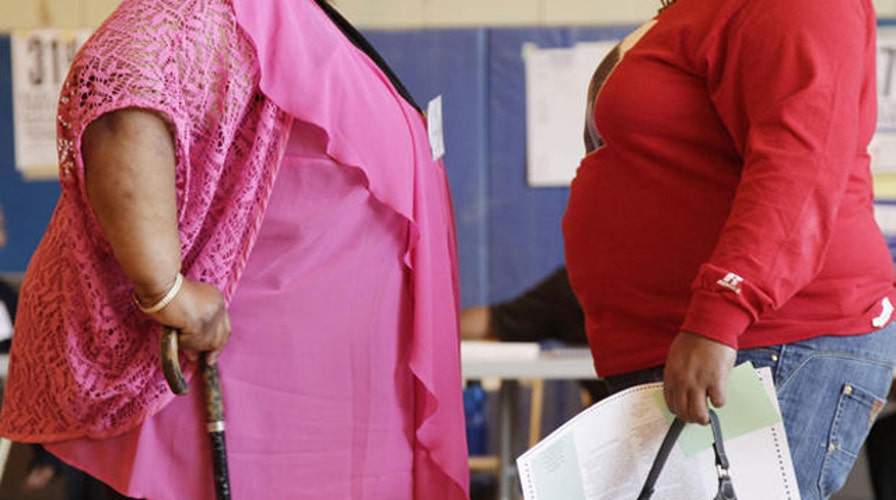Americans' diet improving, not for the poor
Kyle Rothenberg reports how Americans with more money are eating healthier, but diets in lower income households are 'deteriorating' according to a Harvard study
The way you eat may be a reflection of how much money you have, according to a new study.
A 12-year study done by researchers at Harvard University found Americans with more money are eating healthier and tend to consume more fruits, vegetables, nuts and healthy oils, while consuming less trans fats and sugar-sweetened beverages. Salt intake, however, increased over the past decade — which the researchers found “disconcerting.”
People with lower incomes are consuming unhealthier foods and their health has deteriorated over the past several years, study authors noted. Income-related differences in diet quality are likely associated with price, access, and education, according to the study’s authors.
“In many of our nation’s low income communities, you find limited access to real, quality food, and a surplus of unhealthy food,” said Curt Ellis, CEO and co-founder of Food Corps, an organization aimed at changing children’s eating habits.
But while the study found some Americans to be eating slightly healthier, experts agree that overall, our country is in the middle of an obesity epidemic.
Mississippi and West Virginia have the highest rates of obesity in the country at 35.1 percent of the population. Twenty states have obesity rates at or above 30 percent, and not a single state decreased their obesity rates in the past year, according to a new report released by the Trust for America’s Health organization.
One of the reasons has to do with our sugar consumption.
"The American culture is hooked on sugar. That's the reason why one out of every three people in America are obese," said Dr. Leo Huddleston naturopath and chiropractor based in Mississippi, who added that refined foods are also to blame.
Personal trainer Chuck Shelton said he was addicted to sugar and is happy he broke the habit. He went through withdrawal symptoms and experienced serious headaches before overcoming his sugary habit.
"The high you get from the gym – from working out really hard, pushing your body and sweating toxins out – that high feels so much better than that sugar high that’s so quick and then you crash from," said Shelton.
Lifestyle is a big part of the equation – and some Mississippi residents said people are getting lazier.
“We're stuck behind a television or a computer screen all day at work. Or TV at home and video games. We don't get outside -- we don't move anymore," said resident Shanna Paine.
Mississippi-based truck driver Robert Booker is able to keep the weight off. He said all it takes is working out and eating right on a weekly basis.
"I see a lot of overweight truck drivers," said Booker. "But just being able to educate people on how to do things differently, I think if we do that, it will make the whole situation better,” said Booker.
Registered dietitian Jana Woodruff said the information is out there to get educated on eating healthy and lose the weight.
"There's always a way out. There's always a way to get to a healthy weight and a healthier lifestyle," explained Woodruff.
“You can always start by seeing a registered dietician who can help you with a meal plan. There are also support groups … great websites and books,” said Woodruff.
It is not only adults who are impacted, childhood obesity has skyrocketed in the past 30 years. One in three children and teenagers are overweight or obese, according to the Centers for Disease Control and Prevention (CDC).
Jessica Robinson — a mother of three — said she is passing on good eating habits to her children.
"It all starts with the parents. The parents are responsible for teaching their kids how to eat. Kids don't get obese by themselves," said Robinson.
School lunches are often sources of unhealthy food, but in addition to the federal government’s efforts, private organizations trying to get kids to eat better in the school cafeteria. Food Corps. is a national organization bringing educators into classrooms to teach students about nutrition. The non-profit group also plants school gardens and advocates for healthier food in school cafeterias.
"The organization I co-founded supports a nationwide team of leaders - people across the country who are dedicating a year of their lives to public service - teaching kids about real food, helping them grow and cook and taste it," said Curt Ellis, CEO and co-founder of Food Corps.
Environment also plays a role in how you eat, and having supportive people around you makes a difference. Jackson State University student Kala Hobbs said she has gone from 343 pounds down to 315 pounds since February. Hobbs has words of encouragement for those looking for inspiration and motivation.
"All you have to do is start. Take it one day at a time. Every day is different, and once you start, don't give up."

